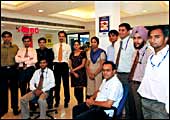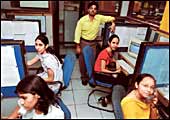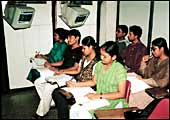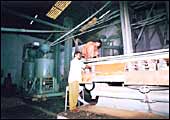|
Busloads,
trainloads and on two-wheelers, they're coming to the big cities.
The action spots that 13 years of reforms have left glistening with
swank office blocks and buzzing with busybodies. They're coming
armed (so they think) with college degrees. For jobs. "Don't,
please!" harried metro-dwellers have often tried to plead;
a rapidly growing economy means job availability everywhere.
Is that true? To see for ourselves, BT decided
to venture into small city India-urban habitations with populations
of over a lakh but under a million.
Creaky Old Order
Traditional employment avenues are quite clearly
on the decline. Take Vellore, some 145 km from Chennai in Tamil
Nadu, for instance. This town of 1.8 lakh was a prominent leather
zone till recently, doing 700 tonnes of it daily and notching up
millions in foreign exchange earnings. Nowadays, though, there's
weariness in people's gait. Tannery after tannery is shutting down,
as the industry seeks sea coastlines along which effluents can be
discharged.
|
KARNAL
|
MEERUT
|
ASANSOL
|
 |
 |
 |
| Wind of change: Companies
and banks, such as HDFC Bank (left), have given new hope to
Karnal, while Escotel has a call centre (centre) in Meerut;
West Bengal's Asansol, despite its NIIT centre (right), has
been a laggard |
Asansol, 200 km from Kolkata, in West Bengal,
is over five times Vellore's size, but is also faced with stagnancy
in old industries such as coal and steel. Those who can, head off
to Kolkata for college. "Few, if any, return to Asansol as
there are hardly any white collar jobs being generated here,"
shrugs Avijit Mukhopadhyay, Assistant Vice President and Branch
Manager, UTI Bank, Asansol Branch. "There are no call centres
here and all our students move to Kolkata, Gurgaon, Bangalore or
Hyderabad after qualifying," adds Sanjib Ghatak, Branch Manager
of NIIT's Asansol Branch.
Meanwhile, Warangal, a city
of 8 lakh, 140 km from Hyderabad in Andhra Pradesh, is suffering
a decline in its carpet industry. Ask A. Ramakrishna, 23, an engineering
student son of a carpet-weaving unit's owner, what career he wants,
and he is clear about it: a secure government job. "Once I
have done my Masters," chimes in K. Murli Krishna, a 23-year-old
pursuing an MCA degree, "I will look for a job in Hyderabad,
Vizag or Bangalore."
A visit to Karimnagar, an agri-based town with
2.5 lakh people, 160 km from Hyderabad, is an even less cheerful
experience. A measure of progress here is a skyline dotted with
chimneys. "There are at least 70 rice mills around the town,"
says M. Dana Kishore, Joint Collector and Additional District Magistrate,
Karimnagar. This is generating jobs for such middlemen as commission
agents who liase with farmers, and for paddy purchase centre officials-but
it's hardly what a young civil engineer would aspire to. The traditional
jobs scenario is no different in places such as Meerut, a city of
a million in Uttar Pradesh, and Karnal in Haryana with its 3.4 lakh
population, 125 km from Delhi. Agri-related trade offer poor options,
and educated youngsters are headed off to the capital city.
Those who stay back have to scramble for every
small opportunity that shows up. When P. Ashok Rao, the manager
of a 10,000-loaves-a-day bread-making unit in Warangal, needed a
supervisor, he was "surprised to find many applications from
engineers and MBAs".
Hope Springs
To file a gloom report from India's rickety
old small towns, however, would do no justice to the excitement
that has actually begun to take hold in these places, as more and
more 'big city' companies troop in to set up local operations. Telecom,
banking and insurance, specifically, are busy creating a large chunk
of the local opportunities. In Burdwan, a town of 3 lakh some 107
km from Kolkata, Reliance Infocomm employs about 35 locals, and
expects to take on more. Starting salaries are about Rs 5,000, and
could rise to about Rs 18,000 in some years. "Good performers,"
says Pradipto Das, Branch Manager and City Head, Burdwan, Reliance
Infocomm, "are sent to the Dhirubhai Ambani Knowledge City
in Navi Mumbai for further training."
|
WARANGAL
|
KANCHEEPURAM
|
VELLORE
|
 |
 |
 |
| Big scramble: Though change
is yet to catch on in Warangal, which still depends on units
like the bread factory above (left), it is visible in Kancheepuram,
with call centres such as DCS' (centre), and Vellore, with startups
such as Royal Computers (right) |
Telecom service provider Escotel has its hub
for Uttaranchal and Western UP in Meerut, where it employs around
300 people, a third of them at its local call centre. Rival operators
such as Airtel and Reliance are also active in this town, and together
with banks such as ICICI Bank and HDFC Bank, have actually managed
to lure some of the townsfolk back from the big city. Nidhi Kapoor,
25, a customer care executive currently with Escotel, for example,
worked with Daksh in Gurgaon, near Delhi, for 18 months before returning
to Meerut. "My parents wanted me to come back earlier,"
she says, "but I didn't because there were no jobs here. But
now, there are lots of jobs."
Vivek Malhotra, Assistant General Manager,
Customer Care, Escotel, Meerut, is distinctly upbeat about the trend
of reverse job migration (from metros to small cities). "Growth
in opportunities would be the same as in B class cities," he
says, "International call centres, having already moved to
B class towns, will now move to smaller towns." Agrees Aman
Awal, Personal Banker, HDFC Bank, Karnal: "There are a lot
of job opportunities for people who want to work." His bank's
direct sales agent has been recruiting a local sales force, and
offers five-digit monthly salaries.
New jobs are also springing up in the unlikeliest
of places. The temple town of Kancheepuram, 76 km from Chennai,
now boasts of DCS, a BPO unit that's a business associate of the
US-based outsourcing service provider Lason. It employs around 220
people. The salaries are far lower than in metros, and the centre
need not even provide such job comforts as airconditioning. It is
hot, but nobody seems to mind. "We are happy to work here,"
says L. Deepa, a supervisor at DCS, "Women are mostly employed
in teaching. We could do with greater opportunities."
|
KARIMNAGAR
|
BURDWAN
|
 |
 |
| Hope amidst gloom: The big
hope for towns such as Karimnagar, with its struggling rice
mills (left), and Burdwan, with its smokestack-era units, lies
in entrepreneurship |
While corporate representatives in small towns
are sounding increasingly gung-ho about job prospects in small cities,
some of them do complain about the quality of available manpower.
"There are job opportunities," asserts Gaurav Sukhija,
Credit Manager (Karnal & Panipat), GE Countrywide Consumer Financial
Services, "but you need the right qualifications. For example,
Karnal needs at least 25 chartered accountants, but they aren't
there."
If pure private initiative is not doing a good
enough job, local officials in some of these places are also trying
to give local employment a push. In Vellore, for instance, A.C.
Mohan Doss, an outgoing district collector, has got the local employment
office to organise 'job melas' in association with private recruiters
every two months. It works like a large campus recruitment jamboree,
with students charting preference lists and attending serial job
interviews in the hope of an on-the-spot appointment letter. The
opportunities range from clerical functions to accountants, supervisors,
salesmen and hospital administrators. This model is now being replicated
across the state.
Entrepreneurship Ahoy
The surest way to spark employment, of course,
is local self-employment. Opportunities do exist, but only for youngsters
who dare to risk a little startup capital. Sometimes, all it takes
is encouragement (and access to credit).
In Vellore, the local administration is busy
counselling the youth on the wonders of starting up on their own.
Among the more enterprising is 30-year-old R. Parvathy, who runs
Royal Computers, a hardware supplying and servicing firm. "I
feel Vellore has got great potential to develop as a hardware location,"
she says. This is the sort of futuristic optimism that India's small
cities need. Remember, some of America's most exciting companies
started in small cities.
-additional reporting by Nitya Varadarajan,
E. Kumar Sharma and Arnab Mitra
SPOTLIGHT
Bakul Dholakia
 |
| Autonomy advocate: No fee cut, says Dholakia |
Just how good a
time is it to run a B-school? Very, if it's an IIM, and autonomy
is what you thrive on. Ask Bakul Dholakia, Director, IIM-Ahmedabad.
He took on the former HRD Minister on the issue, opposing its fee
cut imposition. And-bravo!-has emerged a winner from the fracas,
rallying the IIMs to the idea of regular uniform fees with scholarships
for the needy. He was armed, of course, with a 1993 Kurian Committee
report that had suggested IIM self-reliance on funding (via higher
fees, consulting, executive programmes and the like-how it's done
in the US). "The government's new initiative for uniform fee should
focus on tuition fee rather than fee per se," says Dholakia, "for,
the cost of operation and infrastructure varies for different parts
of the country."
-Amanpreet Singh
COUNSELLING
Help, Tarun!
 I am a 33-year-old sales officer working with an automobile company
for three years now. After graduating in science and then doing
an MBA in finance, I moved to the poultry sector as an assistant
logistics manager. A year later, I took up a sales job with a film
production house, where I worked for a couple of years, before joining
this automobile company. However, I feel that my compensation here
is not commensurate with my work experience or my educational qualifications.
And even with seven years of work experience, when I try looking
for a better job, employers ask for relevant experience. Why is
this and what should I do about it?
I am a 33-year-old sales officer working with an automobile company
for three years now. After graduating in science and then doing
an MBA in finance, I moved to the poultry sector as an assistant
logistics manager. A year later, I took up a sales job with a film
production house, where I worked for a couple of years, before joining
this automobile company. However, I feel that my compensation here
is not commensurate with my work experience or my educational qualifications.
And even with seven years of work experience, when I try looking
for a better job, employers ask for relevant experience. Why is
this and what should I do about it?
Employers usually look for candidates with work experience in an
industry similar to the one for which they are hiring. Your work
experience has neither been related to your educational qualification
nor has it been in similar functions or related sectors. Hence,
it becomes difficult for an employer to consider your work experience
as relevant. However, since you have spent the last five years in
sales and are now with an automobile company, consider taking up
a sales position in the same sector. Alternatively, you could look
for a sales job in the service sector. Once you get a job, however,
work towards moving vertically in the same company.
I am a 25-year-old first class commerce
graduate, pursuing an MBA in marketing from a second rung B-school.
Even though this school has been rated low by various surveys, I
enrolled in it because I am convinced that management is not something
that can be taught in schools-it is a skill that is either inherently
present in an individual or has to be developed by the person himself.
Will this school of thought work against me when I start looking
for a job? Or am I right?
The fact is that you need the right mix of
talent and training to succeed as a manager. It is possible that
you enrolled in the second-rung B-school because you did not get
through a top-rung one. When you start looking for a job, at the
entry level you may not get the same opportunities as those passing
out of top B-schools. However, it is true that if you prove yourself
to be good, the institute from where you do your MBA will not matter
in the long run, only your achievements will.
I am a 27-year-old third engineer (Merchant
Navy) working with a US-based shipping company for the past five
years now. I have done my B.E. in mechanical engineering along with
a one-year marine engineering course from Cochin. However, now I
want to pursue an MBA from the UK or Canada and am planning a complete
career change thereafter. Since I only have experience on-board
ships, I am doubtful about a future in the corporate sector. While
I have an inclination towards marketing management, I would like
to know what specialisation should I opt for to better my prospects
once I complete my post graduation.
With an MBA from any place-the UK or Canada,
you could opt for any function as long as you do not expect employers
to give you credit for your past experience. As for your specialisation,
you would do well to choose operations/maintenance or logistics,
but you need not limit your choices to these. Your first year of
MBA will give you a flavour of all kinds of functions and you could
always decide on where your interest and aptitude lies. If marketing
appeals to you, go for it. With age on your side, opportunities
are not limited for you in the corporate sector.
I am a 37-year-old science graduate with
a diploma in electronics and telecommunication engineering. However,
I am yet to get a job in my field of specialisation. I reside in
Shimla and teach mathematics and art to high school students. I
am paid a paltry sum of money, and it is becoming increasingly difficult
for me to support my family. What kind of jobs are available given
my educational qualifications? Do I need to move out or should I
go in for additional study? If I choose the latter, which course
of study would come in useful?
If you want to go in for further studies, you
could consider doing a course in computer science since you already
have a diploma in electronics and telecommunications engineering.
You could specialise in hardware or software and there are good
opportunities in both. Since you are teaching high school students,
starting your own coaching classes is certainly one way to enhance
your income.
Answers to your career concerns are contributed
by Tarun Sheth (Senior Consultant) and Shilpa Sheth (Managing
Partner, US practice) of HR firm, Shilputsi Consultants. Write to
Help,Tarun! c/o Business Today, Videocon Tower, Fifth Floor, E-1,
Jhandewalan Extn., New Delhi-110055.
Hiring
Happiness
Is hiring set to rise?
A Team Lease-Gallup Employment Outlook report.
Forecasting
has a bad name these days. This survey, conducted jointly by Team
Lease, a job assignment agency, and Gallup, pollster extraordinaire,
did its fieldwork before that happened, though-between 21 March
and 28 April. And this survey offers "the first look at the
organised sector and its employment trends", in the words of
Gallup's Rajesh Srinivasan, Head, R&D.
So-who is hiring-happy and who is not?
Broadly speaking, half the companies surveyed
expect no change in their recruitment rate, while 44 per cent foresee
an increase. Sector-wise, financial services is the least gung-ho
on taking on new people, and other services the most.
The sample: 447 companies from Mumbai, Delhi,
Kolkata, Chennai, Bangalore, Hyderabad and Pune. The idea, according
to Ashok Reddy, Managing Director, Team Lease, was to get a cross-sectional
view of employment expectations in the organised sector, with companies
of varied sizes included in the sample, and from varied industries
ranging from wholesale, retail and information services, to hospitality
and exports. "We wanted to look at grassroot growth and smaller
industries as well," says Reddy. The basic questions were about
industry growth and employment projections. "The reflexive
relationship between business confidence and hiring plans is inseparable,"
observes Reddy.
Delhi, Pune and Bangalore emerge as the most
optimistic cities, perhaps a result of their concentration of manufacturers,
wholesalers and it firms.
On whether it's temporary or permanent staff
the companies want, three-quarters opt for the latter. This could
be taken as a sign of cycle-defiant optimism. The big imponderable
hovering over the report, however, is the change in the operating
environment since the survey was conducted. "So a word of caution
while extrapolating data, because the government influence is inescapable,
and the government has changed," warns Srinivasan. Place the
findings in the macroeconomic context.
To give the exercise credibility over a longer
time span, Team Lease and Gallup promise to do fresh fieldwork every
quarter. "The first few years of the survey will give us important
snapshots and point to point comparisons," says Srinivasan,
"However, as time goes by and we develop a library of survey
results, we anticipate that the survey archive could form an important
basis to separate correlation from causation in employment analysis."
So wait for the next survey, to be done along the same format. Given
the strong views held by the new government on jobs, the results
should be of high interest.
|
